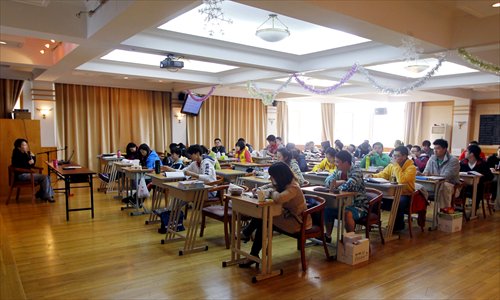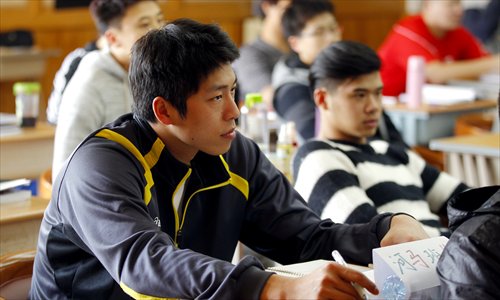Left adrift after retirement, Shanghai sports people offered new path

Retired athletes attend a class as part of the "Hundred People Plan" in Shanghai on April 8. Photo: Yang Hui/GT
Sitting in a classroom in the Shanghai No.2 Sports School, Shen Qiong is no longer the captain of the Shanghai men's volleyball team. He is now the monitor of "class two" of the "Hundred People Plan," a new coaching program for retired sports people in Shanghai.
The one-year scheme offers the city's former athletes the opportunity to comprehensively study sports-related core courses. These full-time students receive the same salary as when they were serving on their teams.
It's the first year of program and around 90 students are taking the classes. "It guarantees an easier transition for me and seven of my former teammates, now my classmates, who are all in our 30s," said the 33-year-old.
Zhao Rongshan, director of the Sports Education Department at the Shanghai Administration of Sports, said the program is the first of its kind in the country.
"Athletes-turned coaches in Shanghai now have to go through this training. Our sportsmen didn't receive systematic physical education in their athletic life. This program helps pave their path to transformation."
New paths
Before the city's finance authority decided to fund the program with several million yuan, Shanghai's sports administration had researched it for a year. The program is open to athletes who retired last year, or between 2010 and 2012, and are now serving as coaches or management officers in the sports system.
The courses they take include fundamental subjects like sports biomechanics, sports anatomy and sports psychology. In addition to domestic experts, professors from the US Sports Academy's International Diploma in Sports Coaching Program will also start to give lessons next month.
The original goal was to better prepare athletes for their future posts, but it's essentially about the sustainable development of sports talents, Zhao told the Global Times. "If we cannot guarantee proper arrangements for our retired athletes, local parents would be even more unwilling to send their children to become professional sportsmen."
Despite China's large population, the number of young people with promising sports potential is still very limited, Zhao said. And given that the city's parents generally put more emphasis on academic scores, it's getting increasingly difficult to bring this talent into the professional training system.
"Honestly, the income for Shanghai's sports people is among the best in the country. And they continue to enjoy a good welfare package when they stay in the system after retirement."
Take the city's women's football team for example. The average annual income for the players is reportedly around 100,000 yuan ($16,127) whereas the monthly pay of their counterparts in some underdeveloped regions could be less than 1,000 yuan.
Becoming coaches is generally regarded as the most common post-retirement path for athletes. Zhao said Shanghai has basically struck a balance between demand and need. In the city, around 70 percent of retired athletes become teachers, coaches and management staff with the sports administration. Another 15 percent join companies and institutions which have sports teams or need sports talents. And the rest accept the administration's one-off retirement payout of 100,000 yuan and find their own employment.
Years ago, however, nearly half of the city's retired athletes found employment by themselves. Between 2000 and 2009, the city's sports administration helped arrange jobs for 564 retired athletes while 503 others took the one-off compensation payment and made their own way forward.
Different attempts have been made to improve the situation. For instance, retired athletes can now sit the civil servant exams. Those who are skilled at martial arts, boxing, judo, kickboxing, wrestling or shooting can apply to join the public security force or the urban management team.

Retired athletes attend a class as part of the "Hundred People Plan" in Shanghai on April 8. Photo: Ni Dandan/GT
Escaping from 'prison?'
The "Hundred People Plan" aims to train better coaches, however, it doesn't demand that these athletes commit to serving the city's sports cause. "This program ensures you get a coach's license. But you don't have to be a coach if you find it isn't suitable," said Shen Qiong. He said that the year can serve as a period for reflection to figure out his future path.
"I've been playing volleyball for more than 20 years. This year will allow my body to properly recover. I might consider going back to play the sport for a few more years. I could take an offer to become a coach or there could be another way out for me," said the 1.98-meter-tall man.
Another star student at the workshop is Ji Ting, a retired women's football player. Ji hit news headlines recently as the restaurant she opened with another three retired women's football players came into business last month. Zhao said that as long as students guarantee their attendance in the classes they are allowed to explore other avenues in their free time.
But not all who are eligible to participate in the program consider it to be worthwhile. Sun Ling served the Chinese women's football team when it claimed the silver medal at the 2004 FIFA U-19 Women's World Championship. She retired last year after the 12th National Games in Liaoning Province where the Shanghai women's football team was the runner-up. "I've been playing football since my childhood. And I don't want the rest of my life to be just about the ball."
Sun is Ji's business partner at the restaurant. But her future job will not be about the catering business. The 29-year-old sat the civil servant exams in January this year and she's looking for a job with the city's traffic administration. "My father suggested that I secure a stable and easy job. And I agreed."
Huang Luna, formerly the goalkeeper of the Shanghai women's football team, agrees with Sun. The 27-year-old compared the past 20 years to staying in a women's prison. "Now I can finally learn about society from another perspective," she said. Huang also sat the civil servant exams in January.
Zhang Sheng, a former member of Shanghai's track and field team, pointed out that there were not as many coaching posts available when he retired 12 years ago. At that time, he was puzzled about his future. Zhang is now working as an urban management officer in Shanghai's Pudong district. But before that, he tried a couple of professions, such as a salesman, a cameraman and a director with a television station.
Uncertainty prevails
Even in recent years, many athletes have had similar experiences to Zhang. They face a future of uncertainty upon their retirement. Some have even made news headlines because of the miserable life they led after retirement.
The most notable examples were weight-lifting gold medalist Zou Chunlan who worked as a scrubber in a public bath, Ai Dongmei, a marathon runner who sold her medals to make ends meet, and Zhang Shangwu, a champion-gymnast-turned beggar.
"Athletes concentrate on one thing for a long time. They don't know much about other things," Yang Yang, a former short track speed skater, told China Newsweek. Yang is the founder of the Champion Foundation, which is dedicated to guiding retired athletes toward their future paths.
During the 2010 Asian Games in Guangzhou, Yang initiated a survey among competing Chinese sports people. Only 4.4 percent said they were clear about their future arrangements after retirement while nearly 80 percent admitted that poor academic performances would be the biggest obstacle preventing them from finding employment.
Qian Zhenglin, a human resources expert, gave a lecture on how to find employment to sportsmen in Beijing last November. He said most of the attendees seemed alienated from society and they looked quite lost. "The age of retired athletes in the class differs a lot - the youngest was only 15 and the oldest was 26. Their sporting achievements also varied. But what matters most when it comes to finding employment is their attitude. No matter whether they were a world or a national champion, they should be aware that they are just a rookie in their new career out of the system."
Figures from China's General Administration of Sport indicate that 3,000 to 4,000 athletes retire every year, and the total number of retired athletes in the country has surpassed 300,000. It's impossible for the State-supported sports system to ensure every one of them gets a job within the system after their retirement. Lu Yuanzhen, a sports sociologist with South China Normal University, suggested that the best solution is to bring education back to sports.
"Why is it hard for retired athletes to find employment? We've got accustomed to linking athletes with low quality and poor academic performances," said Lu.
"The authorities have endeavored to provide athletes college diplomas. But being an athlete and being a student are still two different things."
Xu Lei, a national martial arts champion, told the China Youth Daily about the experiences of a table tennis player he knew. He said the player wanted a university diploma, but he eventually chose a college that didn't require class attendance instead of Tsinghua University or Peking University which do have this requirement.
In Shanghai, Zhao Rongshan with the sports administration, said academic studies receive an emphasis, even when athletes are very young. He said the city's education commission has been cooperating effectively to help improve the situation. The city's two sports schools, which used to have very limited teaching resources, now have the city-level key schools assigned to help improve their teaching quality.
Zhao said that if athletes need to travel outside Shanghai for training, the city usually sends teachers to go to their training bases to tutor them or the government arranges video teaching sessions.